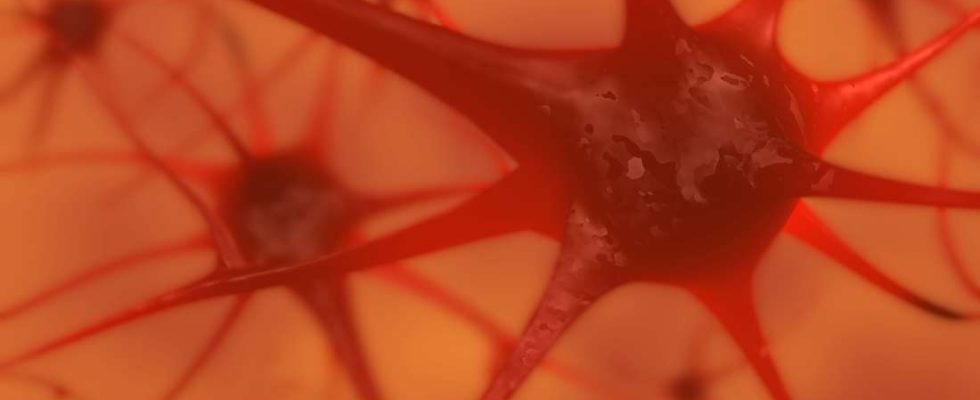Alzheimer’s, a previously incurable disease, could be transmissible. This is shown by a current study. An expert considers the assessment to be “premature”.
London – Alzheimer’s is an insidious disease that causes damage to people’s brains long before the first signs of the disease are noticed. The protein amyloid beta is folded incorrectly and forms clumps in the brain. These small accumulations between nerve cells lead to cognitive losses. There is currently no cure for this neurodegenerative disease, but progress has been made in the development of medications and therapies.
A research group from University College London has now made a worrying discovery: Alzheimer’s could be transmissible. The research team led by neurologist John Collinge draws this conclusion from their work in the specialist journal Nature Medicine published became. In the paper, Collinge and his team describe eight people who were injected with a specific growth hormone in their childhood and first showed neurological symptoms between the ages of 38 and 55.
Is Alzheimer’s transmissible? Research team suspects growth hormone
Five of those people had symptoms of dementia and had either already received an Alzheimer’s diagnosis or met the criteria for it, one said notice to the study. Another person therefore met the criteria for mild cognitive impairment. Because the people were unusually young when they developed the symptoms, the research team suspects that it is not typical Alzheimer’s disease is related to age. Inherited Alzheimer’s disease was ruled out in five people on whom the researchers were able to carry out genetic tests.
The research team therefore focused on the growth hormone that the patients received in childhood. It was a growth hormone (c-hGH) obtained from the brain tissue of deceased people and was used to treat at least 1,848 people in Great Britain between 1959 and 1985. However, when some batches of the growth hormone were found to cause Creutzfeld-Jakob disease, the drug was replaced with synthetic growth hormones in 1985.
Study leader gives the all-clear: growth hormone will no longer be used
In a 2018 study, researchers suspected that people who were injected with contaminated c-hGH and who did not develop Creutzfeldt-Jakob disease could later develop Alzheimer’s disease. This is exactly what Collinge’s research team wants to have shown. However, the study leader immediately gives the all-clear: “There is no evidence that Alzheimer’s disease can be transmitted from person to person during activities of daily life or during routine medical care.”
Co-author Jonathan Schott adds: “It is important to emphasize that the circumstances under which these individuals tragically developed Alzheimer’s are highly unusual.” However, the results could provide valuable insight into the mechanisms of Alzheimer’s, says Schott further. Action is now needed, says Collinge: “The knowledge that amyloid beta pathology has been transmitted in these rare cases should prompt us to review measures to prevent accidental transmission through other medical or surgical procedures in order to prevent such cases to avoid the future.”
Alzheimer’s study: Only a few people were included
Michael Beekes from the Robert Koch Institute (RKI) in Berlin was not involved in the study. He is of the opinion that it is an “important pilot study”, but also has some reservations: “However, the conclusions of the study regarding the transmissibility of Alzheimer’s disease are based on only five patients who were diagnosed three to four decades after treatment Growth hormones have developed dementia.”
Two of the five people have had intellectual disabilities since childhood, “which are associated with an increased likelihood of early onset dementia,” Beekes continued. It is also not a “definitive neuropathological proof of Alzheimer’s”. The scientist would like to see further studies on the topic and emphasizes: “In my opinion, it seems premature to describe the patients’ clinical syndrome as iatrogenic Alzheimer’s disease – that is, caused by medical treatment – based on the currently reported data, and to therefore view Alzheimer’s disease as transmissible .” (tab)
The editor wrote this article and then used an AI language model for optimization at her own discretion. All information has been carefully checked. Find out more about our AI principles here.

